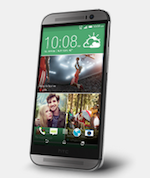Early reviews of HTC One M8 camera point out photographic flaws, refocusing flubs
posted Thursday, March 27, 2014 at 12:22 PM EDT

Earlier this week, HTC unveiled the HTC One M8, their new flagship smartphone. One of the headlining features is the dual-camera setup on the back—a standard 4-megapixel camera, seemingly identical to the module in last year’s HTC One, plus a depth-sensing camera. The idea is that it enables some computational tricks, like re-focusing—sort of like a Lytro, with much less hardware.
Hands-on reviews are starting to roll in, and early reports point out some of the flaws in the HTC One’s re-focusing algorithms—no surprise considering that it’s an early-generation, mostly software-based approach to the trick. Trusted Reviews has the best take on it so far, writing in a first impressions review:
"Unlike ‘real’ shallow depth of field effects, the transition between ‘in focus’ and ‘blurred’ is not very smooth, and we noticed some issues with the edges of in-focus objects. Even in high-contrast borders between background and foreground, there was some muddling of the focus. We also saw some areas of images belligerently staying in focus when they were meant to be blurred out. This may have been down to reflections confusing the HTC One M8 camera."
After TR got more hands-on time with the M8, they noted that the UFocus feature struggled particularly with busy backgrounds, and cast halos around some re-focused foreground images. Check out this shot for an example. (Though their choice to compare the M8's quality against a Fuji X-M1 is apples to oranges.)

A more general complaint about the camera is that the photos just don’t look very good, at least not compared to other major flagship phones like the Samsung Galaxy S4 (soon to be S5) or iPhone 5S. The so-called UltraPixel camera seems to be tuned for low-light photography, where it works well, but the tradeoff is flat, bland images in daylight. As David Pierce at The Verge writes, "The idea is certainly sound, but the execution was wrong then and it’s wrong now.” At BGR, Zach Epstein notes that "the colors in photos taken on the M8′s camera are often washed out and dull. Clarity is also lacking; looking at a full-size image taken by the new One reveals blurred edges and an unacceptable amount of noise.”
What do you think? Are the camera features in the HTC One M8 a gimmick? Does it portend big changes to come? Should we cut them a break for trying something new? Or bust their chops for releasing a half-finished implementation of something that needs more time in the oven?
(Via Image Sensors World)